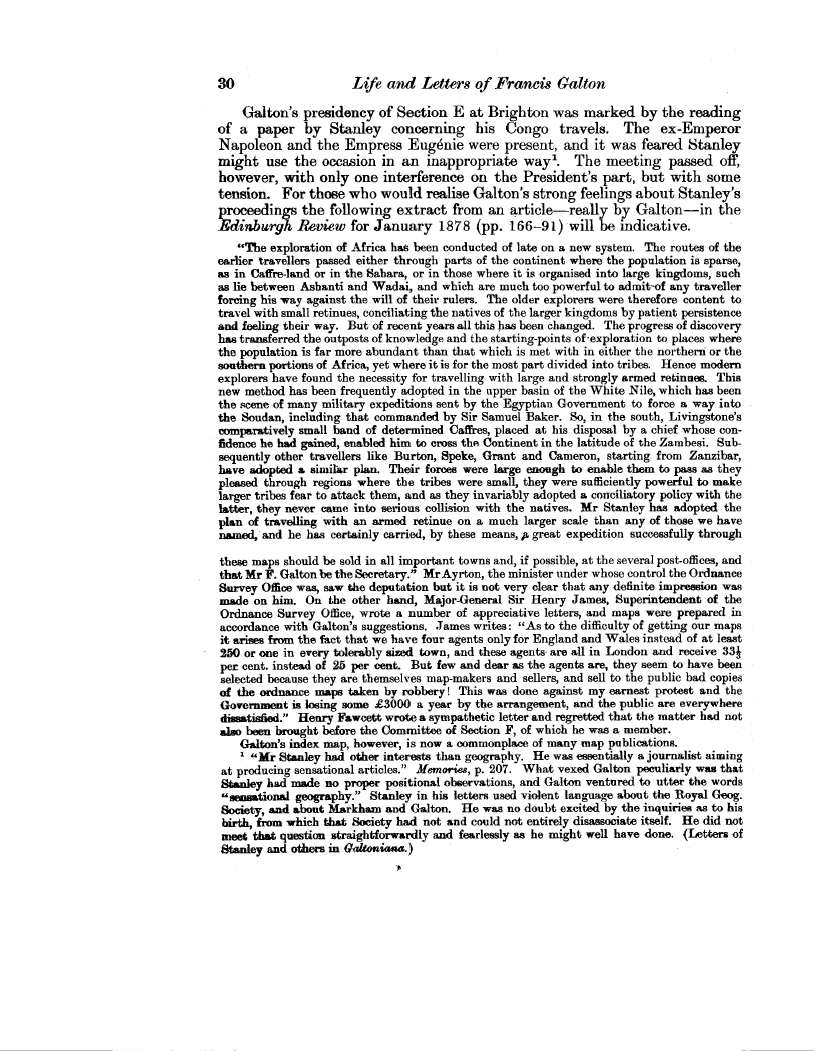30 Life and Letters of Francis Galton
Galton's presidency of Section E at Brighton was marked by the reading of a paper by Stanley concerning his Congo travels. The ex-Emperor Napoleon and the Empress Eugenie were present, and it was feared Stanley might use the occasion in an inappropriate way'. The meeting passed off, however, with only one interference on the President's part, but with some tension. For those who would realise Galton's strong feelings about Stanley's proceedings the following extract from an article-really by Galton-in the Edinburgh Review for January 1878 (pp. 166-91) will be indicative.
"The exploration of Africa has been conducted of late on a new system. The routes of the earlier travellers passed either through parts of the continent where the population is sparse, as in Caffre-land or in the Sahara, or in those where it is organised into large kingdoms, such as lie between Ashanti and Wadai, and which are much too powerful to admit-of any traveller forcing his way against the will of their rulers. The older explorers were therefore content to travel with small retinues, conciliating the natives of the larger kingdoms by patient persistence and feeling their way. But of recent years all this has been changed. The progress of discovery has transferred the outposts of knowledge and the starting-points of -exploration to places where the population is far more abundant than that which is met with in either the northern or the southern portions of Africa, yet where it is for the most part divided into tribes. Hence modern explorers have found the necessity for travelling with large and strongly armed retinues. This new method has been frequently adopted in the tipper basin of the White Nile, which has been the scene of many military expeditions sent by the Egyptian Government to force a way into the Soudan, including that commanded by Sir Samuel Baker. So, in the south, Livingstone's comparatively small band of determined Caffres, placed at his disposal by a chief whose confidence he had gained, enabled him to cross the Continent in the latitude of the Zambesi. Subsequently other travellers like Burton, Speke, Grant and Cameron, starting from Zanzibar, have adopted a similar plan. Their forces were large enough to enable them to pass as they pleased through regions where the tribes were small, they were sufficiently powerful to make larger tribes fear to attack them, and as they invariably adopted a conciliatory policy with the latter, they never came into serious collision with the natives. Mr Stanley has adopted the plan of travelling with an armed retinue on a much larger scale than any of those we have named, -and he has certainly carried, by these means, p great expedition successfully through
these maps should be sold in all important towns and, if possible, at the several post-offices, and that Mr F. Galton be the Secretary." MrAyrton, the minister under whose control the Ordnance Survey Office was, saw the deputation but it is not very clear that any definite impression was made on him. On the other hand, Major-General Sir Henry James, Superintendent of the Ordnance Survey Office, wrote a number of appreciative letters, and maps were prepared in accordance with Galton's suggestions. James writes: "As to the difficulty of getting our maps it arises from the fact that we have four agents only for England and Wales instead of at least 250 or one in every tolerably sized town, and these agents are all in London and receive 331 per cent. instead of 25 per cent. But few and dear as the agents are, they seem to have been selected because they are themselves map-makers and sellers, and sell to the public bad copies of the ordnance maps taken by robbery ! This was done against my earnest protest and the Government is losing some £3000 a year by the arrangement, and the public are everywhere dissatisfied." Henry Fawcett wrote a sympathetic letter and regretted that the matter had not also been brought before the Committee of Section F, of which he was a member.
Galton's index map, however, is now a commonplace of many map publications.
1 "Mr Stanley had other interests than geography. He was essentially a journalist aiming at producing sensational articles." Memories, p. 207. What vexed Galton peculiarly was that Stanley had made no proper positional observations, and Galton ventured to utter the words "sensational geography." Stanley in his letters used violent language about the Royal Geog. Society, and about Markham and Galton. He was no doubt excited by the inquiries as to his birth, from which that Society had not and could not entirely disassociate itself. He did not meet that question straightforwardly and fearlessly as he might well have done. (Letters of Stanley and others in G'altoniaaa. )
A'

